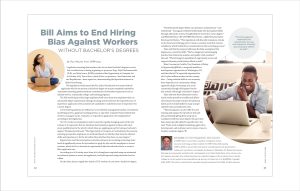Bill Aims to End Hiring Bias Against Workers without Bachelor’s Degrees
Legislation ensuring that workers who do not have bachelor’s degrees receive fair consideration in hiring is gaining co-sponsors. Reps. Raja Krishnamoorthi, (D-IL), and John James, (R-MI), introduced the Opportunity to Compete Act in October 2023. Since then, a total of four co-sponsors—two Democrats and two Republicans—have signed on, demonstrating the bipartisan interest in skills-based hiring.
The legislation would amend the Fair Labor Standards Act to ensure that job applicants who do not possess a bachelor’s degree are not pre-emptively rejected by automated screening systems without consideration of alternative experience such as military service, community college, and training programs.
The bill would require that large employers with more than 500 employees that use automated degree requirement settings in hiring systems disclose the expected years of experience applicants need and allow job candidates to substitute years of experience for a 4-year degree.
Covered hiring systems are defined as “a recruitment management system, recruitment marketing system, applicant tracking system, or any other computer-based system that receives, manages, tracks, evaluates, or responds to applications for employment,’’ according to the legislation.
“As U.S. workers and employers seek to meet the rapidly changing needs of the 21st century, it is imperative that we eliminate discrimination against workers who meet every qualification for the jobs for which they are applying except for having a bachelor’s degree,” Krishnamoorthi said. “The Opportunity to Compete Act will address this issue by ensuring prospective employees are evaluated based on whether they have the relevant skills and experience to do the job rather than whether they have a 4-year degree.”
Experts have said that automation and other advances in recruiting technology have made it significantly easier for job seekers to apply for jobs and for employers to screen resumes, which led to an increase in requirements like educational criteria as a way to filter applicants out.
According to a 2021 study, more than 90% of employers reported using an automated recruitment system to screen job applicants, and half reported using education level as a filter.
On the other hand, roughly two-thirds of U.S. workers do not have a bachelor’s degree.
“Predetermined degree filters can introduce unintentional—and intentional—bias against talented individuals who have gained skills through alternative routes, though [they] do not hold a 4-year degree,” said Michelle Sims, CEO of YUPRO Placement, a skills-first placement firm based in Boston. “This legislation will diversify evaluation criteria on the front end of hiring, prior to when a recruiter even first reviews candidates, which builds fairer consideration in the recruiting process.”
Sims said that the proposal addresses the false assumption that degrees are a proxy for skills. “That’s a dangerous and damaging practice that reduces the number and quality of job matches,” she said. “The bill supports equitable job opportunity access and supports diversity and inclusion efforts as well.”
Blair Corcoran de Castillo, Vice President of Policy at Opportunity@Work, a nonprofit workforce development organization in Washington, DC, said that the bill “is especially important for the 70-plus million workers in this country who … bring valuable skills to our economy from experience in community college, apprenticeships, bootcamps and, most commonly, through skills gained on the job, instead of through a bachelor’s degree.”
Sims said that these alternative educational routes provide accessible and affordable means for people outside of traditional talent pools to build skills for many nonspecialized early and midcareer roles.
“These programs can also offer focused training and support for specific in-demand jobs, potentially giving them a leg up on candidates with four-year degrees because they have honed specific skills for specific jobs,” she said. “Roles such as digital marketing, application development, and customer service may not need a broader academic degree.”

